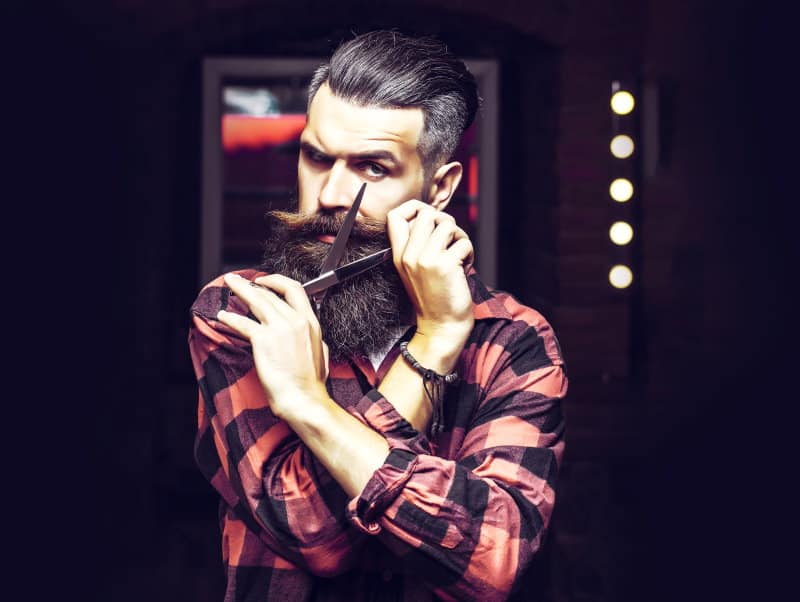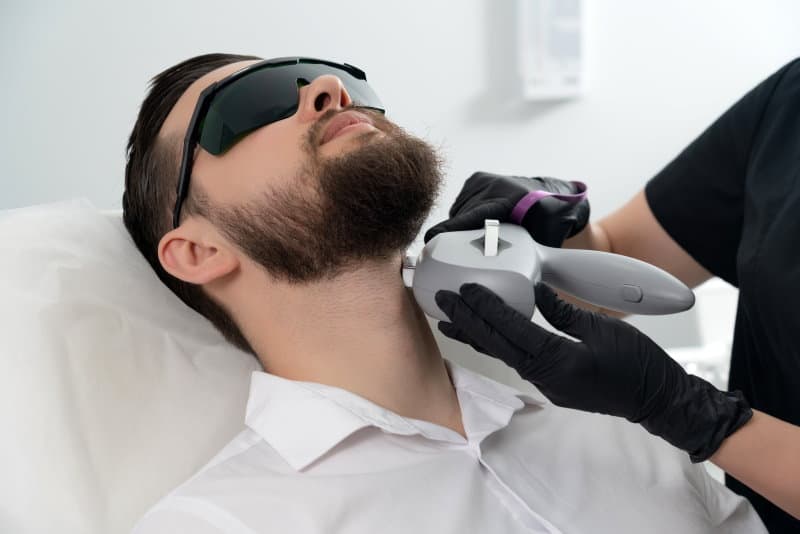Hair is a unique characteristic of mammals, but humans are nearly bald in comparison to other primates. The common theory is that we evolved to have less hair because hair interferes with sweating. However, the theory doesn’t explain why some people are hairier than others.
Abnormally thick facial hair is typically a symptom of an underlying medical condition, such as hirsutism, hyperandrogenism, and, in some cases, PCOS. Genetics can also play a role in the development of excessively thick facial hair.
In this article, we take an in-depth look into the causes of abnormally thick facial hair. We also offer some temporary and almost permanent solutions to reducing thick facial hair, so be sure to stick around!
What Causes Abnormally Thick Facial Hair?

In most cases, abnormally thick facial hair is the result of an underlying medical condition. It’s usually accompanied by other common symptoms, like oily skin, acne, and obesity.
That said, just because someone has a lot of facial hair doesn’t mean they need to see a doctor.
Someone who has excessive thick facial hair without any other observable abnormalities is probably fine.
This is especially true if other members of the family have thick facial hair, indicating that it’s an inherited trait.
Hirsutism
Hirsutism, also known as male-pattern hair growth, is a medical condition in which the individual may develop excessive facial hair growth. That hair is usually darker, thicker, and more coarse than typical body hair.
While hirsutism is more common in women, it can affect men as well. However, it may be more difficult to detect in men due to male terminal hair growth.
Physicians and scientists have yet to determine the precise cause, but there are several conditions known to cause hirsutism.
These conditions include hyperandrogenism, hormonal changes, adrenal gland disorders, Cushing syndrome, and tumors.
Some medications are also known to cause hirsutism, such as minoxidil, danazol, testosterone, and anabolic steroids.
In addition, hirsutism can develop if you come into skin-to-skin contact with androgen-containing topical creams.
Hyperandrogenism
Hyperandrogenism is a medical condition that can happen as a result of external factors as well as natural causes. It can lead to elevated levels of androgens in the body.
One of the symptoms of hyperandrogenism is excessive body or facial hair. It can also cause obesity, acne, and deepening of the voice.
Hyperandrogenism, like hirsutism, is more common in women than in men. Its symptoms are also less noticeable in men because they’re similar to normal male body functions.
However, physicians and scientists have conducted several studies to better understand the symptoms of hyperandrogenism and what high androgen levels can do to a male body.
Aside from the common symptoms, high androgen levels can cause thyroid axis imbalance as well as enlarged prostates.
It’s worth noting that about 70% of female hyperandrogenism cases are the result of PCOS.
PCOS
PCOS, or polycystic ovary syndrome, is a hormonal disorder that causes the ovaries to produce an abnormally high level of androgens.
While men don’t get PCOS, some men from families with a PCOS history can develop manifestations of the medical condition.
Some of the symptoms of PCOS include:
- Excessive hair growth
- Oily skin or acne
- Weight gain
Sensitivity to Testosterone
Unlike popular belief, all men have similar testosterone levels. If that’s the case, then you might wonder what causes some people to have unusually thick facial hair.
The answer is that our bodies react differently to testosterone, and if your body is highly sensitive to the hormone, your hair follicles may respond aggressively to it.
This reaction can go either way: some people develop abnormally thick facial hair, while others develop baldness.
Genetics
The cause of abnormally thick facial hair could be as simple as a gene that runs in the family. Our genes influence facial hair growth as well as how thick, or sparse, it grows.
Some ethnicities, for example, have a familial trait that causes some members to have thicker facial hair than others.
We can often see this trait in people of Middle Eastern, Mediterranean, and South Asian descent—but it’s not exclusive to these ethnicities.
How to Treat Abnormally Thick Facial Hair

Not everyone enjoys having thick facial hair, especially when it borders on being excessive. Luckily, some methods can help reduce thick facial hair.
Keep in mind that you may have to try a few different solutions before finding the method that works best and feels comfortable for you depending on the cause of the abnormally thick facial hair and the severity of the situation.
Shaving
Shaving is the most popular method of facial hair removal because it’s simple, quick, and painless.
It can also be effective if you know how to shave your facial hair in a way that gives you a clean-shaven look.
However, shaving is a temporary solution, so it must be done very regularly to avoid stubble and ensure that the thick hair doesn’t regrow.
Waxing
Waxing is another temporary but effective method of removing facial hair. Many people prefer waxing over shaving because the hair takes more time to grow.
When you wax, you pluck the hair, root and all, from the follicle.
It’s worth noting that the length of time it takes for waxed hair to grow depends on how quickly your facial hair grows and how the process is carried out.
Laser Treatments

Laser treatments are probably the most effective and long-lasting methods for removing thick facial hair.
In those treatments, the laser targets the hair follicles and renders them inactive, eliminating 90% of the hair from regrowing.
That said, laser treatments can be painful and costly. They also require several sessions, depending on the thickness of the hair.
What’s more, it’s rare for facial hair to grow back at its normal thickness and rate after completing laser treatment.
However, hormonal fluctuations can cause the hair to regrow. No need to worry, though!
Hair that regrows will most likely be finer and lighter in color than it was before laser treatment.
Solutions for Medical Conditions
In case abnormally thick facial hair is a symptom of a medical condition, hair removal treatments will only reduce hair thickness but won’t address the underlying cause.
That’s why your physician may prescribe androgen suppressing medications. You may also be given low-dose steroid medications to reduce the activity of your adrenal glands.
Aside from medication, one of the first things that the physician may ask the patient to do is lose weight, whether the patient is a man or woman.
Even if you only lose 5% of your body weight, you can help your body decrease androgen production, which is responsible for the conversion of vellus hair to terminal hair.
Final Thoughts
Having abnormally thick facial hair shouldn’t cause you any dread or insecurity. In fact, some people find thick facial hair attractive, so don’t be discouraged by those who don’t.
Even so, it’s perfectly normal if you don’t like having facial hair. There are numerous methods for reducing its thickness or permanently removing it.
If you, however, decide to embrace your thick facial hair, some styling tips can help you pull off the full beard look. Read more here to learn how to tame your face-mane and keep it out of your eyes.

